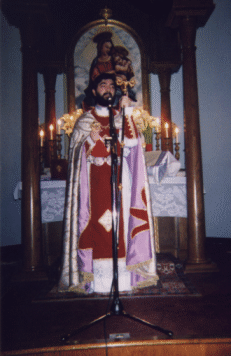

By Very Reverend Father Krikor Chiftjian
Countless people, uninformed about the traditions and concepts of the
The Armenian Church will not conduct funeral services for one who has taken his life with his own hands.
Suicide is an act which has been committed throughout all history, and within all classes of human society. It has been studied intensively by many psychologists specializing in this problem, and it has been explained in numerous ways. Suicide has take place anywhere and everywhere, in palaces of emperors down to the most abject hovels, and equally among all classes of people, those with high intellectual development down to those totally without.
Judging suicide superficially, and giving reasons for it seems to be easy, because people are accustomed to judging things by how they appear.
Thus, on seeing the corpse of a suicide victim who had lived in abject poverty, people will shake their heads in mourning and say that the reason for his deplorable action was that he was destitute. But when, standing before the corpse of a very wealthy person who had committed suicide, people, with a knowing smile, admit that life is vain, and say that the reason for that pitiful suicide is that the victim had not found any meaning in life.
Each individual, with his own peculiar psyche, is like a ball of yarn. For some, the end of the balled-up yarn shows distinctly. For others, the whole ball is one tangled mess, impossible to unravel. Every day, countless people experience disillusionment. And how numerous are those who feel periods of hopelessness! How many lose the will to live! Can there be a count of the many who suffer business failure, and go into bankruptcy! And there can be no end to those who are disappointed, or jilted, in love. The series of causes is endless, and one can give them a collective name, as a basic inducement to suicide ? HOPELESSNESS.
In general, one who lacks a stable intellect, and who commits an act not regarded to be the consequence of natural judgment, is taken to lack responsibility. The death of an individual caused by an accident, and a suicide committed by one who is mentally unbalanced, can be taken to be equivalent, because, both deaths are the result of external, not willful, influences. In the first instance, the cause is the accident. In the second instance, the cause is the mental aberration.
It is difficult for an ordinary person to determine exactly what the cause was for any give suicide. That remains for medical professionals to determine the true cause, although there too, in that field, courts sometimes arrive at unjust verdicts.
The Holy Bible mentions several cases of suicide, for each of which there is a reason. Here are several examples. Saul, fearing he would fall into enemy hands and be killed, took his own sword and fell upon it, committing suicide (1 Sam 31:4). Ahithopel hanged himself (2 Sam 17:23). ?When Zimri saw that the city was taken, he went into the citadel of the King?s house, and burned the King?s house over him with fire and died.? (1 Kings 16:18). But the most woeful suicide mentioned in the Holy Bible is that of Judas, as a consequence of his unpunished betrayal (Matt 27:5).
The reason that the Armenian Church will not conduct funeral services for one who has committed suicide arises from the theological concept that human life is a grant from God. Only He, the grantor of life, has the right to take back that life from you. You were only the receiver of it. During that life granted to you ?freely? you guide it in its ups and downs, buy you have absolutely no right to bring it to an end. Doing that might be compared to throwing a precious gift into the face of the one who gifted it to you. If, in life, you cannot return a gift you regard as the cheapest, or even worthless, back to the giver, or would be ashamed to throw it into the giver?s face, how then could you expect God?s mystical representative, the Church, to act in a benign way toward one who has taken his own life? When you sometimes so strongly and with such intensity defend your rights against your opponent, why then should the Church not defend God?s ?case??
We sometimes come upon situations where someone, in committing suicide, becomes the cause of the death of others. Then, how much more would such a person be responsible before God?s judgment when, in addition to accounting for his own life, he must account for all those other lives that were lost on his account?
It has sometimes occurred that family members of one who has committed suicide ask their pastor to recite appropriate prayers over the deceased. Some pastors, seeing the emotional stress of the bereaved, or being unable to endure their persistent entreaties, finally yield and murmur prayers. Other pastors, have felt it sufficient only to speak consoling and comforting words.
The behavior of the bereaved in such unfortunate circumstances can be understood, considering the seriousness of the crime, a crime against God, the Creator.
Here, then, is our explanation of why it is that the Armenian Church will not conduct the normal funeral services over the corpse of one who has taken his own life.
